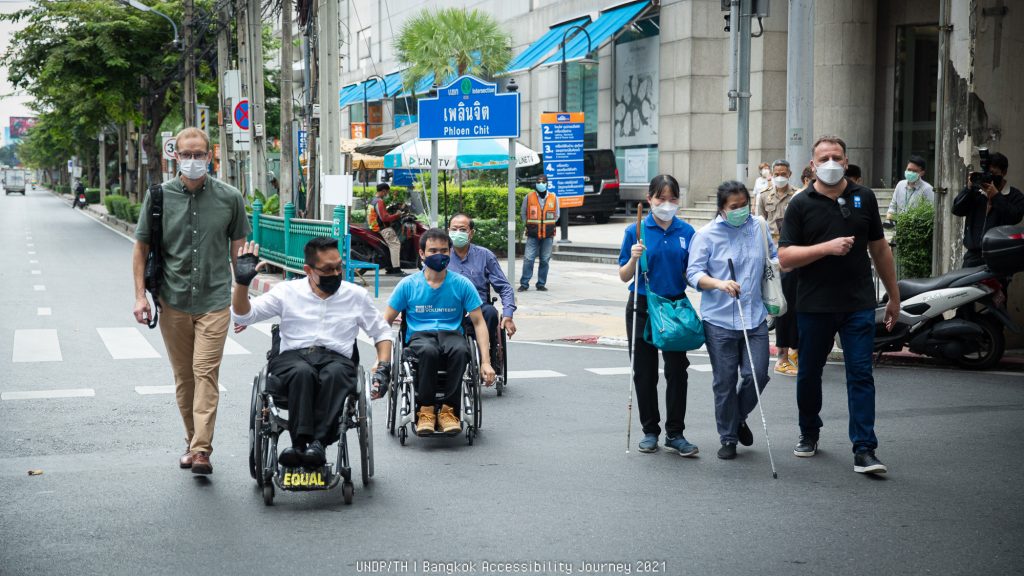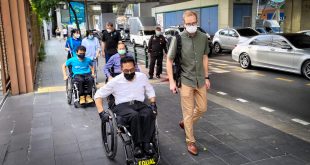
Every year on Dec 3 we mark the International Day of Persons with Disabilities (PWDs), an opportunity to highlight the challenges people with disabilities face in their everyday life and the services and efforts government and other partners need to make to ensure their meaningful inclusion. Because it is critical to realise that disability inclusion is essential to upholding human rights, which is central and a pre-condition towards the achievement of the 2030 Agenda for Sustainable Development and its principle of leaving no one behind.
Ensuring that everyone, including persons with disabilities, has equal opportunities and access to public services increases opportunities to improving one’s health, obtaining a better education, seeking decent employment and more generally enjoying life.
As part of our joint effort to raise awareness and bring to light real-life challenges faced by persons with disabilities, we had the opportunity to experience first-hand the difficulties they face when travelling around Bangkok and using public transport.
Accompanying people using wheelchairs and visually impaired persons, we witnessed how pavements are filled with obstacles and how challenging using public transport remains despite welcomed efforts made by city transport operators, various organizations and private operators to ease access. Uneven pavements and streets create danger and various obstacles to wheelchair users. Having guide blocks in certain areas but not in others make it difficult for visually impaired people to navigate direction. Staircases leading to overpasses that are made to ensure safer crossings actually block access for people on wheelchairs, forcing them to risk crossing the streets.
This eye-opening experiment highlighted how important it is for civil society groups that advocate for the rights of people with disabilities and officials from local administrations, central government and private operators to work together to not only identify the existing challenges but also jointly design the most relevant and appropriate solutions. Demonstrating care and empathy is far from sufficient to solve this issue and better data and detailed information are necessary to successfully improve access. Despite great strides made in recent years to improve mobility for persons with disabilities, there is still much to be done.
In the short term, this may include mapping out the areas in the city where most obstacles and barriers exist, while longer-term solutions would require seeking collaboration from business owners around mass transit systems to build more walkways linking buildings to transport stations as well as installing more elevators with equipment to accommodate those on wheelchairs and the visually impaired. If progress is made in Bangkok, similar results need to be achieved across the country in other localities to ensure equal opportunities for all irrespective of where they live.
More comprehensive and up-to-date data is needed about persons with disabilities and their needs to present convincing evidence to policymakers and reduce existing inequalities. It is undeniable that limited physical accessibility for persons with disabilities to public transportation and facilities to assist them in public areas drastically reduces opportunities to go to school, find and exercise employment and access public services as well as take part in social activities. We encourage all actors to find ways to support the participation of people with disabilities in our normal daily life.
Even while Thailand has ratified the Convention on the Rights of Persons with Disabilities in 2008 and adopted supportive legislation, limited implementation and lack of compliance remain the cause of too many challenges, leading to inequalities in access and a sentiment of discrimination by the people with disabilities.
Empathy is not sufficient. Evidence through data, research and analysis is needed to fill the gaps and foster progress that will enable people with disabilities better access and thereby more opportunities.
The Covid-19 pandemic has reminded the world that we should not take anything for granted. Improving access to public space and transportation for people with disabilities does not only impact them but it benefits us all. So as we mark the International Day of Persons with Disability, let us highlight how disability inclusion would ensure building forward better while leaving no one behind.
– Renaud Meyer: UNDP Resident Representative to Thailand.
– Jyri Jarviaho: Finland’s Ambassador to Thailand.
 Accessibility Is Freedom เข้าถึงและเท่าเทียม | Accessible and Equal
Accessibility Is Freedom เข้าถึงและเท่าเทียม | Accessible and Equal
